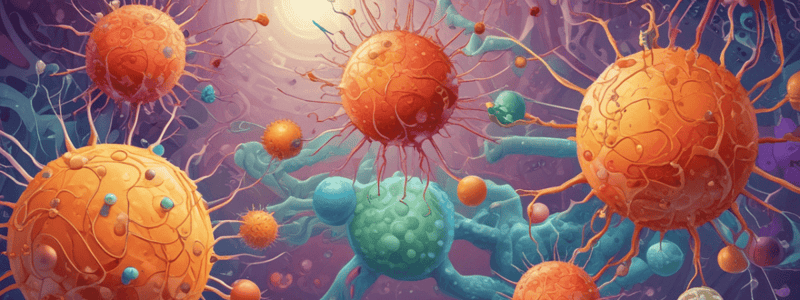Podcast
Questions and Answers
What is the fate of Pre-B cells that cannot express a pre-BCR or receive pre-BCR signals?
What is the fate of Pre-B cells that cannot express a pre-BCR or receive pre-BCR signals?
- Mature into B cells immediately
- Die by apoptosis (correct)
- Undergo positive selection
- Transform into T cells
When does the final maturation step of B cell development occur?
When does the final maturation step of B cell development occur?
- During the pro-BCR stage
- Upon entering the bone marrow
- When IgM is co-expressed with IgD (correct)
- After positive selection
What characterizes the mature B cell capable of responding to antigens in peripheral lymphoid tissues?
What characterizes the mature B cell capable of responding to antigens in peripheral lymphoid tissues?
- Expression of T cell receptors
- Expression of IgM only
- Co-expression of IgM and IgD (correct)
- Absence of any surface markers
When does the co-expression of IgD with IgM typically take place in B cell maturation?
When does the co-expression of IgD with IgM typically take place in B cell maturation?
What is the consequence if an immature B cell remains self-reactive even after receptor editing?
What is the consequence if an immature B cell remains self-reactive even after receptor editing?
What stimulates the proliferation of pro-T cells in the thymus?
What stimulates the proliferation of pro-T cells in the thymus?
What is the role of CD4 and CD8 in T-cell maturation?
What is the role of CD4 and CD8 in T-cell maturation?
What leads to the death of T cells by apoptosis?
What leads to the death of T cells by apoptosis?
What helps promote the survival and proliferation of pre-T cells?
What helps promote the survival and proliferation of pre-T cells?
What is the result of successful V(D)J recombination in T-cell maturation?
What is the result of successful V(D)J recombination in T-cell maturation?
What is the primary function of positive selection in T cells?
What is the primary function of positive selection in T cells?
What is the role of the pre-BCR complex in B cell maturation?
What is the role of the pre-BCR complex in B cell maturation?
During B cell maturation, what cells give rise to a large number of precursors known as pro-B cells?
During B cell maturation, what cells give rise to a large number of precursors known as pro-B cells?
What is the function of surrogate light chains during B cell maturation?
What is the function of surrogate light chains during B cell maturation?
What is the result of a T cell recognizing a weak binding to self MHC I-self peptide complex during positive selection?
What is the result of a T cell recognizing a weak binding to self MHC I-self peptide complex during positive selection?
What happens if a T cell strongly binds to self MHC (class I or II)-self peptide complex during negative selection?
What happens if a T cell strongly binds to self MHC (class I or II)-self peptide complex during negative selection?
Why do T cells that do not recognize an MHC molecule in the thymus die by apoptosis?
Why do T cells that do not recognize an MHC molecule in the thymus die by apoptosis?
Study Notes
B Cell Maturation
- e-B cells express a functional μ heavy chain, an essential component of the pre-BCR and BCR.
- Pre-B cells that cannot express a pre-BCR or receive pre-BCR signals die by programmed cell death (apoptosis).
- The IgM-expressing B lymphocyte is the immature B cell.
- The final maturation step involves coexpression of IgD with IgM through alternatively spliced H chain transcripts.
- Coexpression of IgM and IgD enables B cells to respond to antigens in peripheral lymphoid tissues.
- This coexpression occurs either in the bone marrow or after B cells leave the bone marrow and go to the spleen.
Selection of Mature B Cells
- Positive selection is based on the expression of complete antigen receptors, not on the recognition specificity of these cells.
- Negative selection: immature B cells that bind self-antigens in the bone marrow may reexpress the VDJ recombinase enzyme and undergo additional light-chain V-J recombination to change their receptor specificity (receptor editing).
- If B cells are still self-reactive after receptor editing, they may die by apoptosis (deletion).
Maturation and Selection of T Lymphocytes
- T cell progenitors migrate from the bone marrow to the thymus for maturation.
- Pro-T cells (double-negative thymocytes) do not express CD4 or CD8; IL-7 produced in the thymus stimulate their proliferation.
- CD4 and CD8 are co-receptors that display strong specificity for MHC class II and I, respectively.
Maturation of T Lymphocytes
- Successful V(D)J recombination leads to the expression of TCR β-chain protein on the cell surface with pre-Tα protein, forming the pre-TCR complex of pre-T cells.
- The pre-TCR complex delivers intracellular signals that promote survival, proliferation, and TCR α gene recombination.
- Surviving cells express the complete αβ TCR and both CD4 and CD8 coreceptors (double-positive T cells or double-positive thymocytes).
Positive Selection of T Cells
- MHC I and MHC II molecules are recognized by CD8+ and CD4+ T cells, respectively, in the thymus.
- Positive selection of T cells involves recognition of MHCII-self peptide complexes by CD4+ T cells and MHCI-self peptide complexes by CD8+ T cells.
Negative Selection of T Cells
- T cells that strongly interact with class I or II MHC-peptide complexes in the thymus undergo apoptosis.
- Negative selection removes autoreactive T cells that recognize self-MHC-self peptide complexes with high affinity.
Summary
- Lymphocytes undergo multiple selection steps during maturation to preserve useful specificities based on the expression of intact antigen receptor components and what they recognize (self or nonself).
- Both positive and negative selection are mediated by recognition of the same set of self MHC-self peptide complexes in the thymus.
Studying That Suits You
Use AI to generate personalized quizzes and flashcards to suit your learning preferences.




